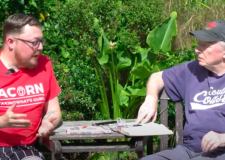Avoid being gazumped
Welcome back, readers! I would like to say I have been basking in the sun on Brighton beach but the weather had other ideas!
The inherent unpredictability of weather is in many ways a good metaphor for the property market. With so much uncertainty around, I find some clients facing distress and despair as the twin monsters, “gazumping” and “gazundering”, rear their ugly heads more frequently.
‘Gazumping’ is the term used when a seller accepts an offer from one potential buyer, but then accepts a higher offer from someone else. The first buyer is effectively being forced to decide whether to offer a higher price or accept that they have lost that house.
This is more common in a buoyant market where there are more buyers than there are properties for sale.
The problem is, until contracts have been exchanged, the sale agreement is not legally binding.
The seller’s estate agent is legally obliged to inform them of any offers made on their property, and it is up to the seller to consider them.
If the seller wants the property to be removed from the estate agent’s register, he or she must make the request in writing, and some sellers prefer not to do so until the contracts are signed.
“Gazundering is more common in a slow market”
Gazundering is where the buyer waits until everybody is poised to exchange contracts and then lowers his or her offer on the property. If the seller refuses, the whole chain might collapse.
It is more common in a slow property market where there are more sellers than there are buyers although it may also reflect a genuine downturn in property prices in a specific area.
Here are my top tips to avoid/beat these two property monsters:
• Act efficiently and ensure that everyone else involved is too i.e. solicitor and agents.
• If possible, look for a seller whose agent has a policy on gazumping.
• If you are a buyer, keep in regular contact with the seller and their agent so they know you are proactively pursuing the purchase. This way they are less likely to consider any other offers.
• Insist the house be taken off the open market once your offer has been accepted.
• Set a realistic asking price – the longer your house takes to sell the more likely you will be to consider a much lower figure.
• As a seller, be honest and tell the buyer about any defects.
• Be reasonable and make a counter-offer, if appropriate.
Ask your Conveyancing Solicitor and estate agent for further guidance.
Healys LLP, 8-9 Old Steine, Brighton BN1 1EJ.





















